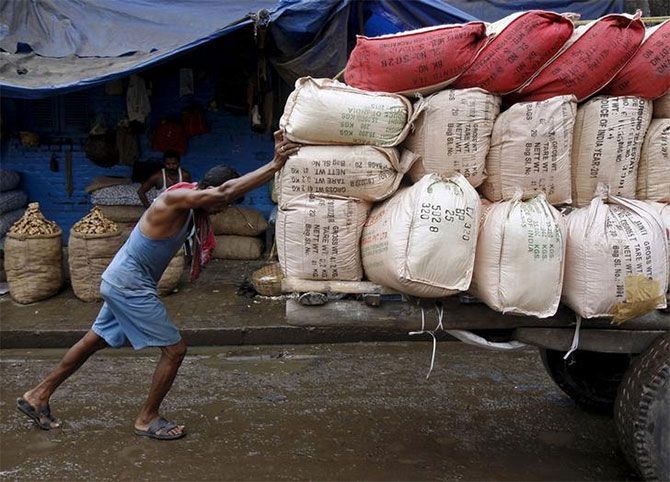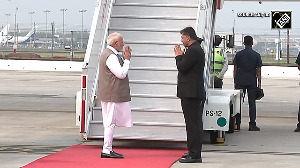On Thursday, the Business Advisory Committee of the Lok Sabha, which allocates time for the Bills and discussions to be taken up for the forthcoming week, met, but the government strategists didn't ask the members to allocate time for the GST Bills for the next week.
Business Standard's Archis Mohan and Amit Agnihotri report.

Demonetisation is on course to claim yet another victim.
The roll-out of the Goods and Services Tax (GST) regime is set to miss the April 1, 2017 deadline.
It looks increasingly improbable that the three GST enabling Bills -- the Central GST, Integrated GST and State GST -- could be passed in the remainder of the ongoing winter session of Parliament, which concludes on December 16.
While the GST Council is set to meet on Sunday and Monday to discuss the drafts of these three Bills, Parliament will have two holidays -- on Monday and Tuesday on account of Eid Milad-un-Nabi -- with the session left with only three days to discuss the three Bills, if the GST Council meeting manages to reach a consensus.
However, that looks unlikely.
Opposition-ruled state governments, particularly the Trinamool Congress-ruled West Bengal and Left-ruled Kerala, want the GST delayed.
They have argued that demonetisation has hurt their finances, which would not be able to withstand the pressure of the GST roll-out.
Bengal Finance Minister Amit Mitra on Thursday said the state government has suffered a loss of Rs 7,000 crore (Rs 70 billion) in revenue.
Opposition sources, including that in the Congress, said non-National Democratic Alliance ruled state governments were united in their demand for a delayed GST roll-out. However, they put the blame on the government for the situation,
Communist Party of India-Marxist General Secretary Sitaram Yechury on Thursday said the GST draft Bills were yet to be circulated.
"Various state finance ministers have highlighted the revenue loss because of demonetisation. The GST tax slabs were worked out on the basis of revenues of the last year. These rates, in the post demonetisation context, are meaningless," Yechury said.
Opposition parties also point out it wasn't them who were proving to be a stumbling block, but the Narendra Modi government's resolve to roll out the GST by April 1 has weakened after demonetisation.
The three GST Bills are money Bills to be taken up by the Lok Sabha.
On Thursday, the Business Advisory Committee of the Lok Sabha, which allocates time for the Bills and discussions to be taken up for the forthcoming week, met, but the government strategists didn't ask the members to allocate time for the GST Bills for the next week.
Union Finance Minister Arun Jaitley has cautioned of a Constitutional crisis if the GST is not rolled out by mid-September 2017, the one-year validity of the GST Constitution (amendment) Bill.
However, Yechury disagreed. "This might be his interpretation, but there are ways out of that imbroglio," he said.
Constitutional expert Subhash Kashyap, a former Lok Sabha secretary general, says such a situation was unlikely to arise, but even if it does there are ways out.
The next window for the passage of the GST Bills is the Budget session, which is likely to begin in end-January, with the Budget set to be presented on February 1.
The passage of three Bills during the Budget session, which is primarily devoted to discussing Budget-related issues, could still make it possible for the government to have the GST roll-out before the mid-September deadline.
However, for this the government would need to engage with the Opposition parties, particularly the Congress.
The Congress is against the four slab tax structure.
Congress Vice-President Rahul Gandhi is against the upper limit of 28% as he strongly supported an 18% cap. He is of the view that any rate above 18% will adversely impact small traders and consumers and that the Congress should be seen as championing the cause of the consumers.
Photograph: Rupak De Chowdhuri/Reuters












